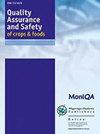工业和烹饪实践对火鸡肉中生物活性多胺水平的影响
IF 5.3
3区 农林科学
Q1 FOOD SCIENCE & TECHNOLOGY
引用次数: 5
摘要
多胺,包括腐胺、亚精胺和精胺,是存在于几乎所有食品中的生物化合物。其理想的生理作用包括细胞分裂和生长。因此,在肿瘤患者的饮食中是不可取的。本研究旨在评估固化剂(氯化钠(0-2 g)、亚硝酸钠(0-200 ppm)、聚磷酸钠(0-0.5 g)和抗坏血酸(0-500 ppm))、烹饪(油炸(180°C)和煮沸(100°C))对火鸡胸肉中多胺含量的影响,采用基于中心复合设计和分散液液微萃取的响应面法。采用配备紫外检测器的高效液相色谱法研究后处理变化。研究结果表明,在火鸡肉中添加氯化钠、亚硝酸钠和聚磷酸钠显著降低了腐胺和精胺的含量(P < 0.0001)。添加抗坏血酸作为固化剂,多胺的浓度略有增加,而与热过程没有显著的线性影响。研究发现,在煎炸模式下,氯化钠、亚硝酸钠、聚磷酸钠和抗坏血酸等固化剂分别为2g、200ppm、0.5 g和382 ppm,可将精胺和腐胺的含量降至最低,可取率超过96%。总之,固化添加剂和烹饪是减少火鸡胸肉中多胺的有前途的方法。本文章由计算机程序翻译,如有差异,请以英文原文为准。
Industrial and culinary practice effects on biologically active polyamines level in turkey meat
Polyamines, including putrescine, spermidine, and spermine, are biological compounds present in nearly all food items. Their desirable physiological effects include cell division and growth. Hence, are undesirable in the diet of patients with tumor. This study aimed to assess the impact of curing agents (sodium chloride (0–2 g), sodium nitrite (0–200 ppm), sodium polyphosphate (0–0.5 g), and ascorbic acid (0–500 ppm)), cooking (frying (180°C), and boiling (100°C)) on polyamine contents in turkey breast meat using response surface methodology based on central composite design and dispersive liquid-liquid microextraction. Postprocessing changes were investigated using a high-performance liquid chromatography equipped with an ultraviolet detector. Study outcomes showed the presence of sodium chloride, sodium nitrite, and sodium polyphosphate in turkey meat reduced the putrescine and spermine content significantly (P < 0.0001). The addition of ascorbic acid as a curing agent slightly increased the concentration of polyamines, while no significant linear effects were associated with the thermal processes. The study observed that curing agents like sodium chloride, sodium nitrite, sodium polyphosphate, and ascorbic acid at 2 g, 200 ppm, 0.5 g, and 382 ppm, respectively, in frying mode minimized spermine and putrescine content with more than 96% desirability. In conclusion, curing additives and cooking are promising procedures for polyamine reduction in turkey breast meat.
求助全文
通过发布文献求助,成功后即可免费获取论文全文。
去求助
来源期刊

Quality Assurance and Safety of Crops & Foods
FOOD SCIENCE & TECHNOLOGY-
CiteScore
4.60
自引率
7.50%
发文量
61
审稿时长
1 months
期刊介绍:
''Quality Assurance and Safety of Crops & Foods'' is an international peer-reviewed journal publishing research and review papers associated with the quality and safety of food and food sources including cereals, grains, oilseeds, fruits, root crops and animal sources. It targets both primary materials and their conversion to human foods. There is a strong focus on the development and application of new analytical tools and their potential for quality assessment, assurance, control and safety. The scope includes issues of risk assessment, traceability, authenticity, food security and socio-economic impacts. Manuscripts presenting novel data and information that are likely to significantly contribute to scientific knowledge in areas of food quality and safety will be considered.
''Quality Assurance and Safety of Crops & Foods'' provides a forum for all those working in the specialist field of food quality and safety to report on the progress and outcomes of their research.
 求助内容:
求助内容: 应助结果提醒方式:
应助结果提醒方式:


